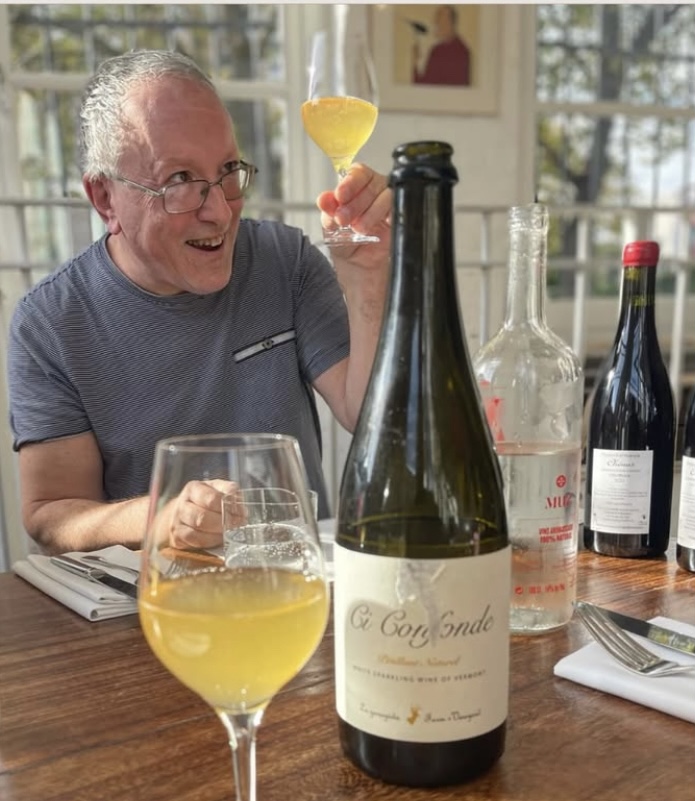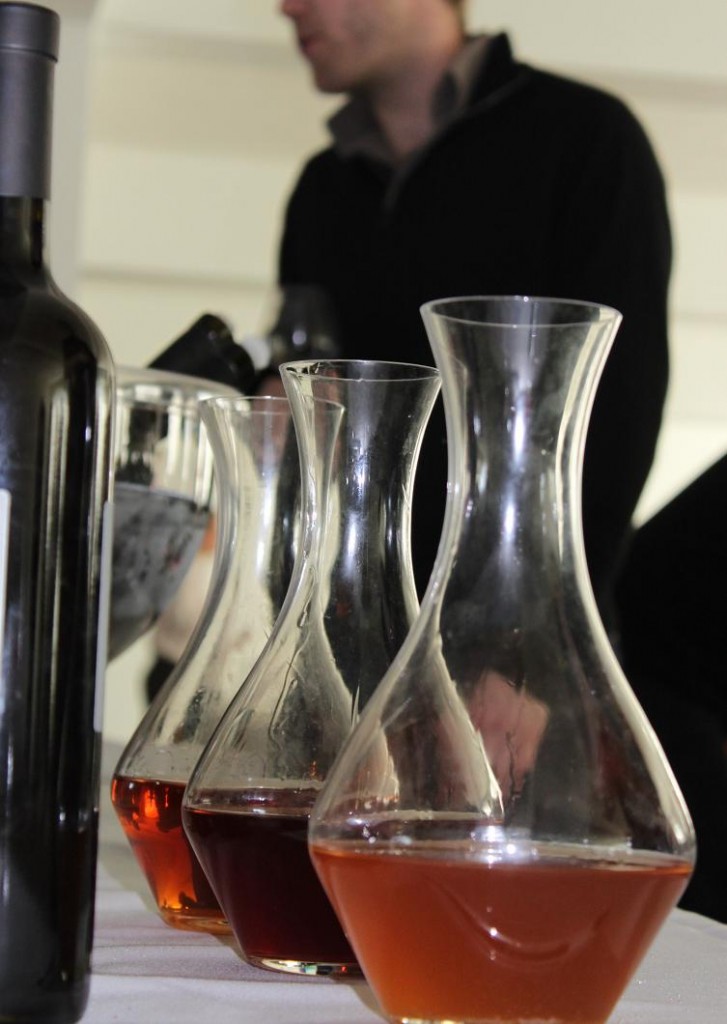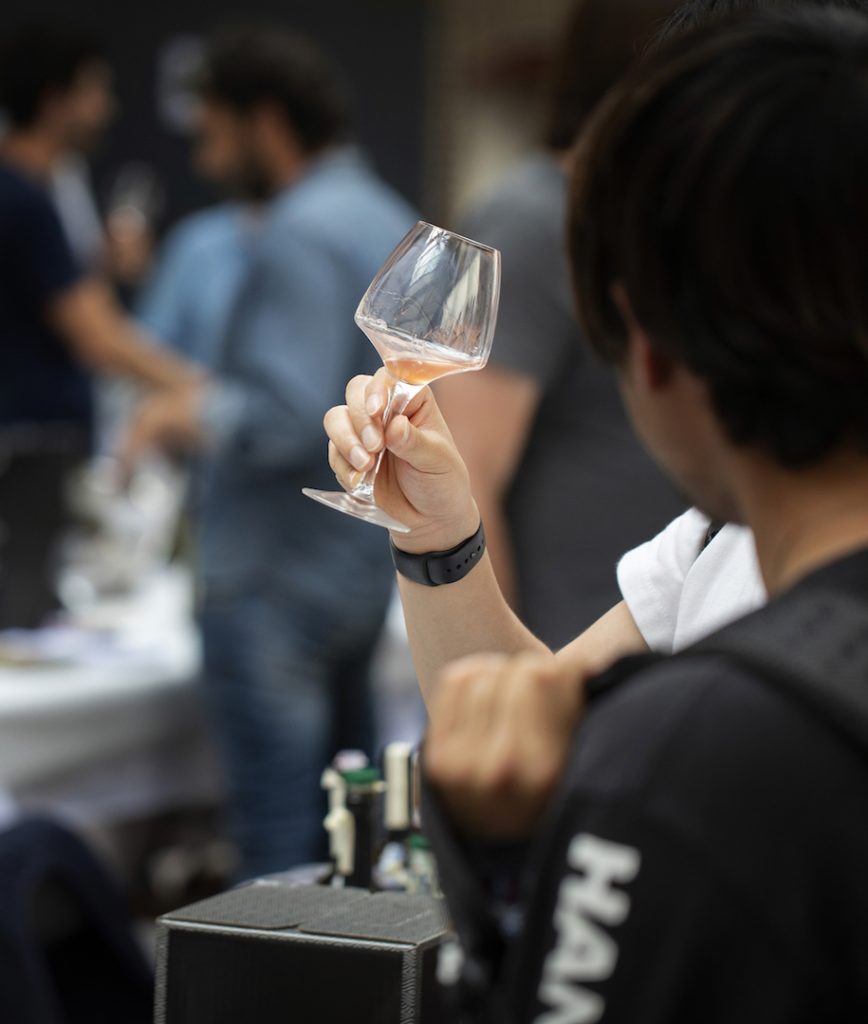“Wildness reminds us what it means to be human, what we are connected to rather than what we are separate from.”

Every so often, when there is a full moon, say, I try to chisel a definition about what constitutes a natural or real wine. I am sure the fixed status of being known as natural is not an absolute position for most vignerons. Instead, the vine-tending and wine-making is a constant journey that involves walking the line between idealism and expediency. For some, going natural–for want of a better expression–is natural; it comes with the territory, it fits their persona, they see it as a form of self-expression. For others, working without safety nets is not something they feel comfortable with, as they view wine primarily as a stable, consistent product to be protected at all costs against fault, and dare one say, inaccuracy.
Even if one were able to arrive at a nominal definition of natural winemaking, there are many specific issues that incite debate and dispute, such as skin contact, cold carbonic maceration, the type of fermentation and maturation vessels, no/low sulphur, organic/BD farming, wild yeasts, and beyond that still wide-ranging philosophical and political issues such as freedom, the importance of aboriginal varieties, the definition of terroir, defence of appellation, and so on.
I am sure the fixed status of being known as natural is not an absolute position for most vignerons. Instead, the vine-tending and wine-making is a constant journey that involves walking the line between idealism and expediency.
Nothing is as obvious as it seems. It is easier to start with the tricksy word and work back. The bald definition of natural is simply being in accordance with, or determined by, nature. In terms of wine, it means not having any extra substances or chemicals added – not containing anything artificial; closely resembling an original – true to nature; marked by easy simplicity and freedom from artificiality, affectation, or constraint.
A natural product is one that bears a strong relationship to its origins (in the vineyard). Transformations may have occurred, but something unique and original has been preserved. The wine tastes real – it possesses energy, purpose, life, as opposed to being the aggregation of a series of confections. It is the body rather than the clothes, or the skin in all its mottled glory rather than the plastic surgery.
That this is a matter of degree rather than an absolute state of either/or should not be a matter for dispute. That it is a story of human involvement goes without saying, however, it is also to do with harnessing or channelling rather than imprinting and superimposing, a process of physical (and perhaps even spiritual) accompaniment rather than the execution of a recipe by means of chemical (and other) manipulations.
Putting life into the bottle and letting it live.
Natural winemaking means no short-cuts; it is not about achieving a facsimile product. It exalts the journey or process itself, from the very nature of the vintage to the transformation of grape juice into wine.
It’s always about the grapes – the grapes from a living vineyard pulsating with micro-organisms, yeasts, worms and bugs, plants and flowers, birds – an eco-system, a self-sustaining chemical-free polyculture. Life in wine comes from life in the vines. Nothing can come of nothing.
The vine grower is part of this world and has an intimate and tactile relationship with the vines.
The subsequent interventions in the winery determine not just the degree of naturalness but the very nature and shape of the final wine itself.
Natural winemaking involves the very process of investigation: the encounter with and shaping of raw materials. It is about the nature of adaptability. It is about the culmination of process and transformation into something original and unique that people can appreciate and respond to in their own way. That is alchemy. That is creation. For real wines are…living wines.
“It tastes natural”
When we taste we owe it to ourselves (as well as to the vigneron and their wine) to be receptive. Increasingly, I try to experience wines more completely, by not insisting, but rather sensing them, not itemising my impressions as if I were searching out a shopping list of qualities, but casting judgement aside, tasting inside out, exploring personality, viewing flaws as textural variations within the whole rather than diminishing faults. I want to dive into the internal story, engage with origin. I am into mutability and playfulness on occasions. I like simplicity and singularity, wine as haiku, the miniature of grace and purity. I like structure, but I don’t always need structure. Wilfulness is also fine. Energy, tension, cut and crunch. Juice gushing over my tongue. All this.
Suspending over-acute critical faculties is an important part of this receptiveness. My instincts are my real processors. If the wine possesses life then I am not above it, not grafting my preconceptions nor opinions onto it, not showering it with real or metaphorical points. For I know nothing except that which I know at the moment. When I’m tasting I need respond to the wine as the wine itself– to feel what it was intended for, be it juice for gulping, or a liquid vinified slowly and carefully in order to age gracefully. I should factor in other variables in my determinations, such as the weather, the calendar, my mood, whom was I tasting with.
It is about the nature of adaptability. It is about the culmination of process and transformation into something original and unique that people can appreciate and respond to in their own way. That is alchemy. That is creation.
The act of tasting places us in a necessarily artificial situation. Whilst I’m sure that oenologists do make wine to withstand critical scrutiny, many artisan wines were never intended to be mercilessly magnified in this fashion. Wines, real living wines, take their colour from the context. As mentioned, one’s perception and appreciation of wine (for example) varies considerably according to the person you are experiencing it with. There is one master of wine with whom I have never tasted a bottle that did not exhibit some technical flaw, as if the very act of dissection served to infect the very nature of the wine itself! Conversely, when I taste with certain people, the wines always seem to sing. Strangely, it is as if the generosity of spirit and predisposition to find pleasure activates a life-force in the wine, whereas the deconstructive analytical tendency discovers a wine that is indeed the merely sum of all of its faults. Negativity is toxic. So is cultivated indifference. Positivity is the biodynamics of the spirit!
When you are open-minded you respond spontaneously. When I encountered my first natural wine twenty plus years ago in a Parisian wine bar I was shocked (in the best sense). The wine was primal and raw. It probably had high VA and doubtless a number of other jagged faults– but was it high, and too high for what? For my enjoyment of wine? Assuredly not. I knew nothing of the wine nor the grower, but I felt the difference, the ridiculous jolting energy, the fermented wildness in the glass and I still remember all this as if it were yesterday.
There is a lovely scene in Jonathan Nossiter’s Natural Resistance in the vineyard of La Stoppa, owned by Elena Pantaleoni, wherein we are invited to the table to enjoy the company of friends, family and work colleagues as they have lunch. As the meal progresses and the wine kicks in (it is a golden-hued skin-contact wine that seems to capture and then radiate out the sunlight) the mood changes from intellectual to passionate, to serious, to confidential, to teasing. We can see that wine is the catalyst for, and the background to, the discussion, the emptying bottles showing that the proof of pleasure truly is in the drinking.
Elena’s niece (who is studying oenology) remarks that all they teach you at wine college is to use this chemical or that. They never teach you history, culture…Wine is a scientific problem to be solved, it exists as a series of equations and finite options and viewed as set transformations achieving settled objectives. The divide between families and friends drinking the fruits of the vineyard that they are sitting in and enjoying freewheeling discussions about wine (the politics, the culture, the people, the actuality of the wine) and the gospel of narrow chemical prescriptions as preached by wine schools could not be wider.
Asseverating that wine is surely made to be enjoyed, to bring people together around a table in the jolliest fashion, seems unnecessary, yet criticism, by constantly arbitrating on personal taste, has (over)colonised our enjoyment of the product. Where wine is appreciated as an artisan product, where deliciousness is prized, where drinking good wine is the catalyst to bright conversation, the seasoning for food, the foundation for camaraderie and the instigator of pleasure, loosening inhibitions and kindling the imagination, then there is indeed truth in wine, albeit you never see it listed in the ingredients on the label.
When I encountered my first natural wine I was shocked. The wine was primal and raw. I knew nothing of the wine nor the grower, but I felt the difference; the ridiculous jolting energy; the fermented wildness in the glass. And I still remember all this as if it were yesterday.
There are faults and faults; it is wise not to be absolutist in these matters and indulge in a tyranny of fault-finding wherein anything that deviates from the designated cleanliness/godliness norm must naturally trigger a disparaging response. We all have our tolerances. Some of the wines that some people laud to the heavens I find undrinkable for so many reasons, and I find it reassuring that the opposite is also the case!
Whilst we can merrily agree to disagree about taste it is perhaps unwise to describe– and damn- any and all wines at a wine tasting as unpleasant (because you “believe” it must be so) so as to create an ideological platform from which to attack low/non-intervention wines – when you are in absentia. It is not just absence that makes the mind grow more cynical; we have to ask ourselves whether this is a fair summary or even an approximate depiction of the truth, or simply an opinion cultivated by some critics pleased to flaunt a professional contrarianism. It is the argument used by people who have philosophical difficulty with the mere concept that good wines might be successfully made in such a fashion – resulting in a critical approach that is akin playing the man rather than the ball. As Keats wrote aphoristically in a letter to his friend John Hamilton Reynolds, “axioms in philosophy are not axioms until they are proved upon our pulses.” Opinions, even when they are couched as if they are statements of unvarnished truth, are still opinions, for all that. In the wine world where drinking and enjoyment are paramount these axioms are indeed proved upon our pulses.
Elevating the discourse above the notion of wines as functional microbiological and chemical transformations into a more poetic narrative about vines, place, people, life and love and much more, brings us closer to the real purpose of wine. Respecting this story shows a desire to form a relationship with the wine, otherwise it becomes merely a vehicle for different transactions, a highly processed product with a finite commercial purpose.
“Wine…changing even as we taste it, delivers a message with meaning only in our response. If we are in the right key when we receive it, our eyes will shine and we shall radiate pleasure,” wrote Gerald Asher in The Pleasures of Wine. Tasting is an opportunity to learn for those who are open-minded, drinking wine an opportunity to experience pleasure for those who are truly tuned in to that possibility.
Those that enjoy drinking natural wines relish them for a variety of reasons. One is a sense of the life within, something to do with the way the wines move when one puts them in one’s mouth. Then there are the edges, the tiny flaws, that mark these wines as individual. The feeling that the wine exists on its own merit rather tasting the mediating architectural intent of the winemaker. The drinking of the wine, the effortless consumption, and above all, the sense of nourishment, the wine, this fermented natural product that warms the stomach and aids digestion. It is not that every natural wine confers delicious pleasure. Some are awry, moody, faulty to a fault, others don’t chime with your sense or need at the moment.
So, how do you recognise a natural wine by its taste? I am tempted to leave it at this: When you know, you know.



